The Best Foods to Eat for Prostate Health, According to Dietitians

YOU, OR SOMEONE you know, may be flaunting a mustache around this time of year in honor of Movember—the annual event devoted to raising awareness of men’s health issues such as prostate cancer. While it's fun to show your support by putting down the razor, it's important to also take this time to evaluate what you're doing for your own prostate health—including incorporating the right prostate-healthy foods.
“The severity of prostate health cannot be overstated, as it is estimated that one in every eight men will likely receive a diagnosis of prostate cancer at some point in their lives,” said Kelsey Costa, R.D.N.. “Research has consistently demonstrated the impact that dietary habits and lifestyle can have on prostate health.”
Recent studies reveal that diets rich in omega-3 fatty acids, particularly DHA, may slow down prostate cancer growth, while diets that promote inflammation might increase the risk of aggressive prostate cancer. Other lifestyle factors, such as consuming more vegetables and tea, reducing fat intake, abstaining from alcohol and tobacco, and maintaining a healthy weight can all lower prostate cancer risk.
“Prostate health and prostate cancer are very important in men's lives. It is often said that if every man lives long enough, he will eventually develop prostate cancer. A lot of men do not seek care when they start to have urinary issues, but that can be the earliest sign of prostate problems,” says Laura Purdy, M.D., a board-certified family medicine physician based in Miami, FL. “It's important to maintain a healthy lifestyle with a balanced healthy diet as well, because this can promote overall wellness and decrease your risk of progression to all kinds of diseases.”
Keep reading for what you should know about prostate health and what foods to eat to support it.
Why is Prostate Health Important?
“Prostate cancer, prostate enlargement, and prostate inflammation are all prostate conditions that can affect quality of life. Good prostate health ensures that you can continue enjoying an active and comfortable life as you get older, and it can help catch any potential issues early when they are easier to treat,” says Brianne Okuszka, R.D.N.
Prostate cancer is fairly common in males, and the risk increases as you age, Purdy says. Good news is, if it’s caught early, there’s a good chance the cancer is treatable. So, pay attention to your health and talk to your doctor if you find anything out of the ordinary, like difficulty urinating, urinating often, or finding blood in urine or semen.
What Can You Do to Better Your Prostate Health?
Along with eating a healthy diet—partaking in physical activity, quitting smoking, and limiting alcohol intake are all key for your prostate health. As Purdy put it, prioritizing a healthy lifestyle promotes overall wellness and health—for your prostate and beyond.
To prevent prostate cancer, get your prostate checked regularly by a doctor. If you are noticing any early signs of prostate problems consult a doctor immediately about your concerns.
“Do not ignore any of the early warning signs. Some early warning signs may include painful urination, the constant urge to urinate which includes waking throughout the night, painful ejaculation, erectile dysfunction, and even pain in the lower back, pelvic area, or hips,” Purdy says.
The Best Foods for Your Prostate
Let's make it clear: there’s no magic food that will safeguard you from prostate issues.
“There isn't enough solid evidence that says eating certain foods can help lower your chances of getting prostate cancer, but if you eat a balanced healthy diet it promotes overall wellness and decreases the risk of progression to many diseases,” said Purdy. “Your diet can significantly impact your health, including your prostate health.”
With that cleared up, here are 7 foods that may benefit your prostate.
Tomatoes
“Tomatoes are a rich source of lycopene, an antioxidant that has been associated with a decreased risk of prostate cancer,” said Costa. Consuming cooked or puréed tomatoes, such as spaghetti sauce or tomato juice, can enhance the body's absorption of this beneficial antioxidant. Lycopene helps neutralize harmful free radicals and reduce oxidative stress in the body.
“There is an association between oxidative stress and prostate problems, including prostate cancer,” she said. “Lycopene possesses potent antioxidant properties, prevents DNA damage, inhibits tumor cell proliferation and growth, and mediates cell cycle arrest.” Some studies show that lycopene could also benefit men at risk for prostate cancer.
Can you find lycopene-rich food sources elsewhere? Yes. “Lycopene is also found in watermelon, grapefruit, and papaya,” says Purdy.
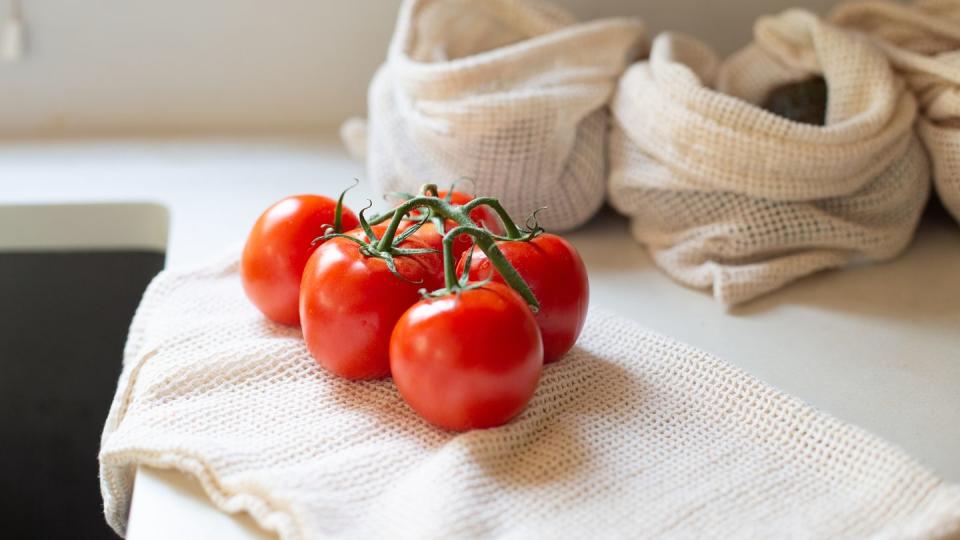
Cruciferous Vegetables
As if you need another excuse to add ultra-healthy, fiber-rich cruciferous veggies like broccoli, Brussels sprouts, cabbage, kale, bok choy, and cauliflower to your diet.
“Some compounds in cruciferous vegetables may help regulate hormone levels, particularly androgens like testosterone. Hormone imbalances can contribute to prostate problems, and these vegetables may have a role in regulating hormones,” says Okuszka. “Plus, chronic inflammation is a known risk factor for prostate conditions, including prostate cancer. The anti-inflammatory properties of cruciferous vegetables may help reduce inflammation in the prostate gland.”
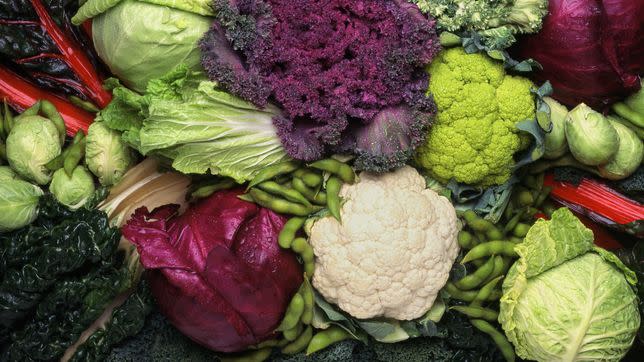
Pumpkin Seeds
Pumpkin seeds can also help keep your prostate healthy. “Pumpkin seeds provide fiber, protein, magnesium, manganese, zinc, and healthy fat. Their high zinc content may be beneficial for prostate health,” she says.
Sprinkle some on your oatmeal, use ‘em as a crunchy topping for salads, or eat pumpkin seeds by the handful with a piece of fruit as a nutrient-dense and filling snack.
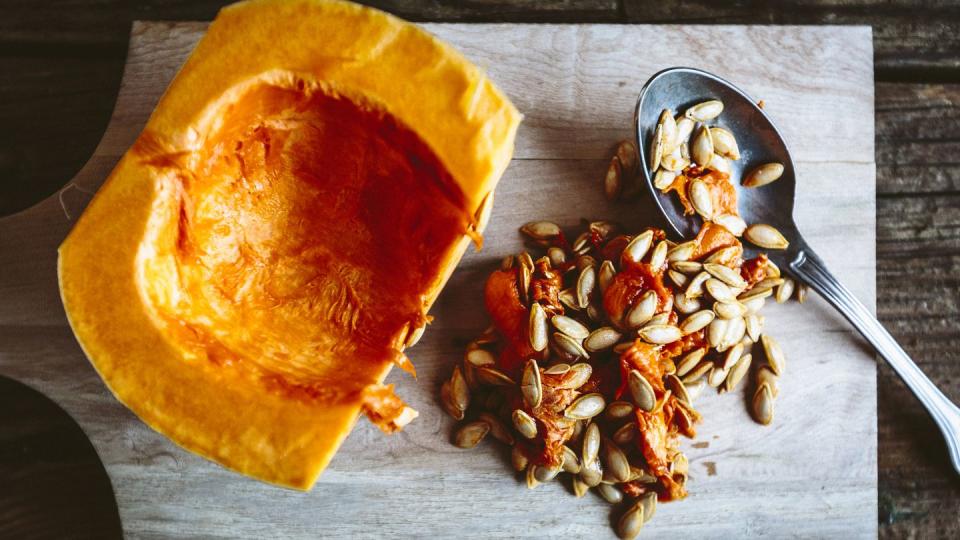
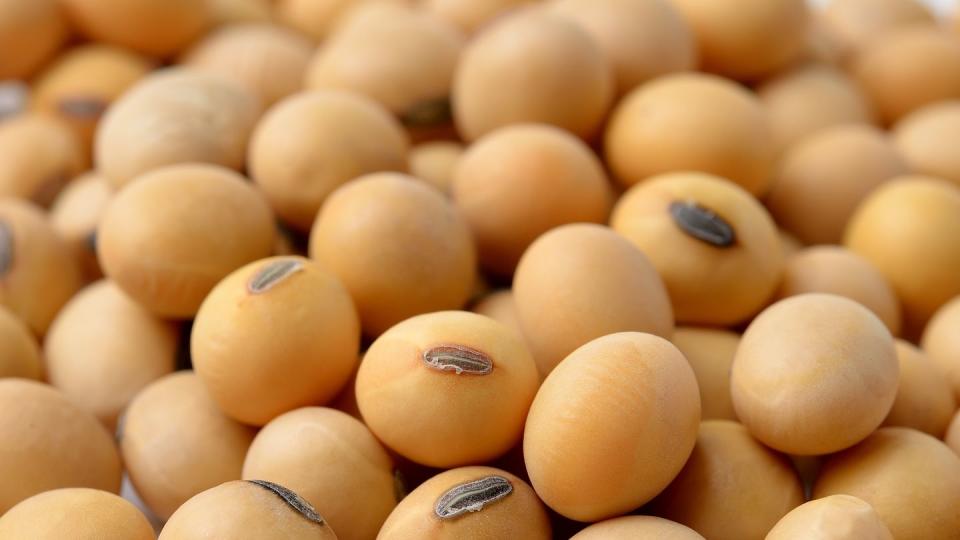
Berries
“Some studies suggest that the antioxidants and phytonutrients in berries may have a protective effect against certain types of cancer, including prostate cancer,” says Okuszka. “While more research is needed to establish a definitive link, including berries in a balanced diet may be a proactive step in reducing cancer risk.”
Berries are also packed with antioxidants, including vitamin C, vitamin A (in the form of beta-carotene), and various phytonutrients such as flavonoids and polyphenols.
“This is helpful for overall health which indirectly affects prostate health,” Okuszka says.
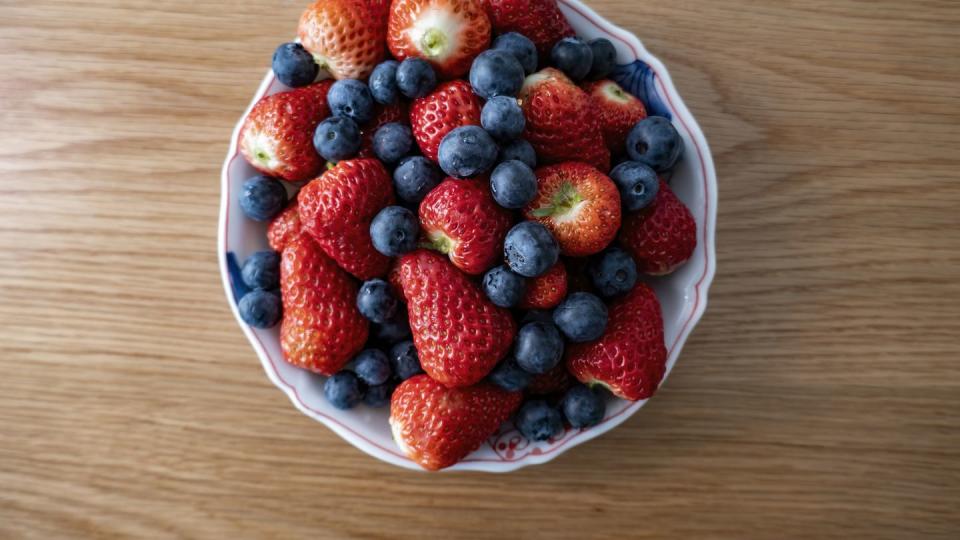
Pomegranate
Pomegranates promote prostate health as they’re “packed with a high concentration of antioxidants and have the potential to protect against chronic diseases associated with oxidative stress.”
While more research needs to be done, according to the National Cancer Institute (NCI), pomegranate have been seen to restrict growth of prostate cancer cells.. Drink unsweetened pomegranate juice or eat the seeds (arils)—the flesh of this fruit is not well digested.
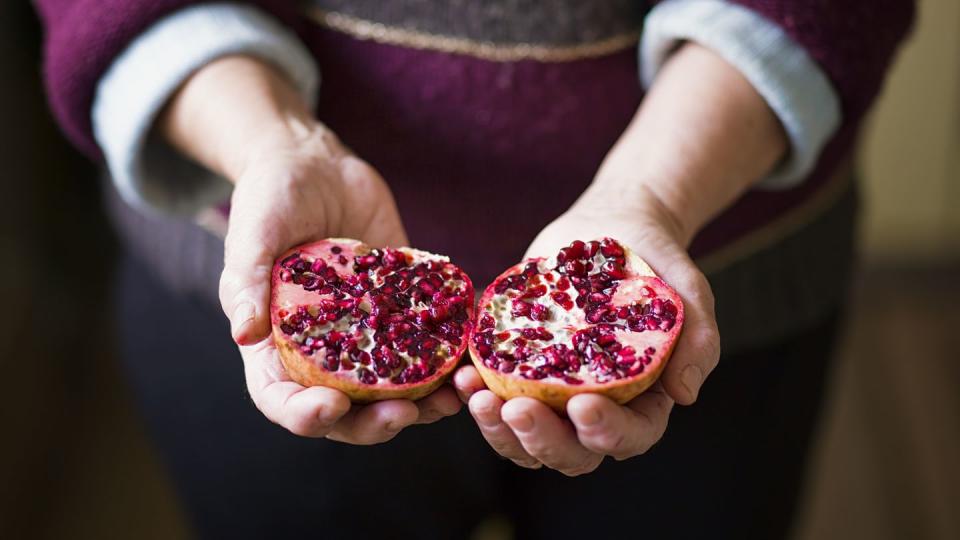
Green Tea
We know it’s not a food but this uber-healthy beverage deserves a shoutout.
“Green tea is high in antioxidants called catechins and other beneficial compounds, which have demonstrated potential in lowering prostate cancer risk,” says Costa. “Its protective qualities are attributed to its potential to influence how quickly a tumor grows, promote the natural process of cell death in unhealthy cells, influence hormone-related signals, regulate the cycle of cell development, and mitigate harmful behaviors of cancer cells.”

You Might Also Like

